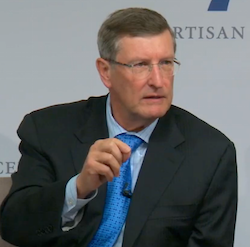
Requiring most employers to offer retirement plans for their workers would help ensure that Americans have enough money to pay for their needs after they stop working, the nonprofit Bipartisan Policy Center said in a new report issued Thursday.
The center’s Commission on Retirement Security and Personal Savings recommends that, beginning in 2020, employers with 50 or more employees that do not already offer a retirement plan should be required to automatically enroll employees into a new Retirement Security Plan or myRA. The plans could be managed by a third party, and employees would have the ability to change contribution amounts or opt out of contributing.
The report, “Securing Our Financial Future: Recommendations for Retirement Security and Personal Savings,” is designed to address several challenges that lead to Americans not having enough money to fund their retirements and putting stress on government programs.
“We are encouraged in the bipartisan interest to address these issues and hope the commission’s recommendations will contribute to meaningful action to achieve a secure retirement future for all Americans,” said former Sen. Kent Conrad, who co-chaired the commission with James B. Lockhart III, vice chairman of WL Ross & Co. and former principal deputy commissioner of the Social Security Administration.
Among other recommendations, the commission also suggests adjusting Social Security’s tax and benefit levels. The plan calls for widows and widowers to collect their own Social Security benefits as well as 75% of their deceased spouses’ Social Security benefits.
“That would make an amazing difference in elderly poverty,” Conrad said at a press conference announcing the report. “The best estimates are that we would reduce elderly poverty by 33%, by a full third, and lift a million people out of poverty.”
The commission’s discussions related to Social Security were its most difficult as it worked on the recommendations, Conrad said. One member of the 19-member panel, Kilolo Kijakazi, Ph.D., a fellow at the Urban Institute, chose not to endorse the final report for related reasons.
“The reasons she gave me were really twofold,” Conrad said. “She did not want to see an increase in the retirement age, however gradual — and our increase is very gradual: one month of increase for every 24 months. And she didn’t want to see the application of the Consumer Price Index as the inflation adjustor for Social Security.”
The 152-page report as well as a 16-page summary are online.



